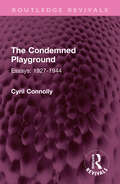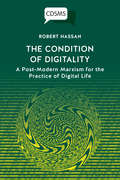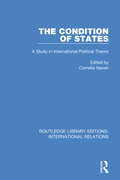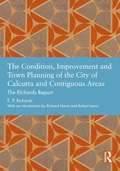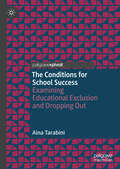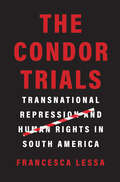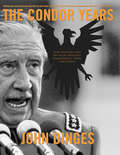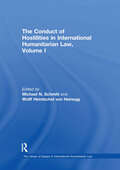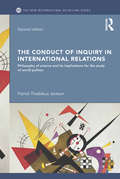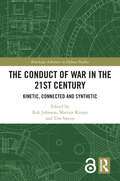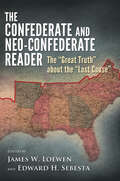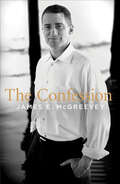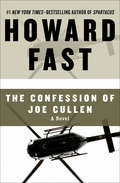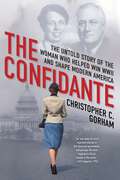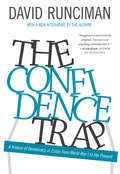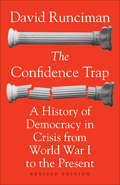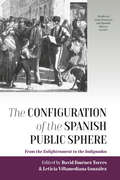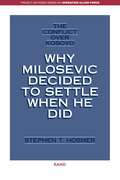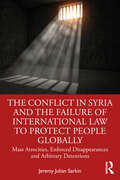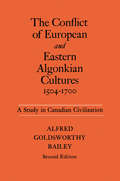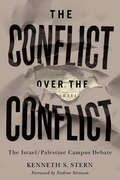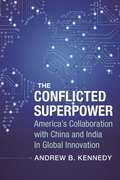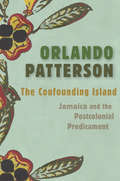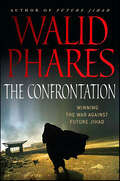- Table View
- List View
The Condemned Playground: Essays: 1927-1944 (Routledge Revivals)
by Cyril ConnollyFirst published in 1945, The Condemned Playground expresses the author’s personal views on art and literature and the social science. Infinitely entertaining and witty, at times devastatingly destructive and never merely kind, Mr. Connelly has, nevertheless, an underlying note of critical integrity and even moral fervour. This book will be of interest to students of history and literature.
The Condition of Digitality: A Post-Modern Marxism for the Practice of Digital Life (Critical Digital and Social Media Studies #2517-1623)
by Robert HassanDavid Harvey’s The Condition of Postmodernity rationalised capitalism’s transformation during an extraordinary year: 1989. It gave theoretical expression to a material and cultural reality that was just then getting properly started – globalisation and postmodernity – whilst highlighting the geo-spatial limits to accumulation imposed by our planet. However this landmark publication, author Robert Hassan argues, did not address the arrival of digital technology, the quantum leap represented by the move from an analogue world to a digital economy and the rapid creation of a global networked society. Considering first the contexts of 1989 and Harvey’s work, then the idea of humans as analogue beings he argues this arising new human condition of digitality leads to alienation not only from technology but also the environment. This condition he suggests, is not an ideology of time and space but a reality stressing that Harvey’s time-space compression takes on new features including those of ‘outward’ and ‘inward’ globalisation and the commodification of all spheres of existence. Lastly the author considers culture’s role drawing on Rahel Jaeggi’s theories to make the case for a post-modern Marxism attuned to the most significant issue of our age. Stimulating and theoretically wide-ranging The Condition of Digitality recognises post-modernity’s radical new form as a reality and the urgent need to assert more democratic control over digitality.
The Condition of States (Routledge Library Editions: International Relations #8)
by Cornelia NavariRejecting the view that states may be studied in isolation from one another, and proceeding from the assumption that political theory and international theory are part of a single continuum, this collection of essays employs both comparative method and an international perspective to assess what is happening to the chief political form of our time. In doing so, it questions recent major approaches of European and American scholarship which have tended to view the state as a formation serving capital, interests or classes. The approach of these essays is legal and constitutional, highlighting the changing nature of political communities and changing patterns of government.
The Condition, Improvement and Town Planning of the City of Calcutta and Contiguous Areas: The Richards Report (Studies in International Planning History)
by E. P. RichardsBy 1900 the British had undertaken various types of urban planning in their colonial territories, but the early twentieth century brought new ideas and the birth of the modern planning movement. In India these new planning ideas inspired several specialized reports after 1900, most of which drew explicitly on British, or occasionally German, ideas. The most complete of these studies was the Richards Report on Calcutta, prepared for the Calcutta Improvement Trust and published in 1914. Its major concerns included the building and widening of roads, slum clearance and improvement, legislation, and suburban planning. As background, it included written and visual documentation of living conditions, through charts, photographs, and maps. Richards emphasized that conditions in Calcutta differed greatly from those in urban Britain, and made some allowance in that regard. In general, however, his report exemplifies the attempt by British planners, along with Indian elites, to impose their vision on colonial cities. Richards’ report was well-received by leading British planners of the day. A notice in Garden Cities and Town Planning claimed that it was "the most complete report on town conditions and possibilities which has yet been issued". While the immediate impact of the report in Calcutta is moot - Richards was highly critical of the past practices of local officials, and his views were unpopular with his superiors - the Richards Reports remains a crucial insight into both the development of modern town planning and the colonial period in India.
The Conditions for School Success: Examining Educational Exclusion and Dropping Out
by Aina TarabiniThis book analyses the role played by schools themselves in the high rates of educational exclusion and dropping out that affects many European education systems. The author frames the analysis according to three aspects of justice – redistribution, recognition and care – to explore both how teachers explain and react to the processes of educational failure and early school leaving, and how young people make sense and cope with the same failures. Using extensive qualitative data from schools in the Barcelona area, the author analyses the impact of school segregation, methods for managing diversity and teaching expectations: and subsequently how they can contribute to the production and reproduction of the risks of failure and ESL in contemporary education systems. This book will be of interest and value to students and scholars of educational exclusion, as well as school leaders.
The Condor Trials: Transnational Repression and Human Rights in South America
by Francesca LessaStories of transnational terror and justice illuminate the past and present of South America&’s struggles for human rights Through the voices of survivors and witnesses, human rights activists, judicial actors, journalists, and historians, Francesca Lessa unravels the secrets of transnational repression masterminded by South American dictators between 1969 and 1981. Under Operation Condor, their violent and oppressive regimes kidnapped, tortured, and murdered hundreds of exiles, or forcibly returned them to the countries from which they had fled. South America became a zone of terror for those who were targeted, and of impunity for those who perpetuated the violence. Lessa shows how networks of justice seekers gradually materialized and effectively transcended national borders to achieve justice for the victims of these horrors. Based on extensive fieldwork, archival research, trial ethnography, and over one-hundred interviews, The Condor Trials explores South America&’s past and present and sheds light on ongoing struggles for justice as its societies come to terms with the unparalleled atrocities of their not-so-distant pasts.
The Condor Years: How Pinochet and His Allies Brought Terrorism to Three Continents
by John DingesA &“compelling and shocking account&” of a brutal campaign of repression in Latin America, based on interviews and previously secret documents (The Miami Herald). Throughout the 1970s, six Latin American governments, led by Chile, formed a military alliance called Operation Condor to carry out kidnappings, torture, and political assassinations across three continents. It was an early &“war on terror&” initially encouraged by the CIA—which later backfired on the United States. Hailed by Foreign Affairs as &“remarkable&” and &“a major contribution to the historical record,&” The Condor Years uncovers the unsettling facts about the secret US relationship with the dictators who created this terrorist organization. Written by award-winning journalist John Dinges and updated to include later developments in the prosecution of Pinochet, the book is a chilling yet dispassionately told history of one of Latin America&’s darkest eras. Dinges, himself interrogated in a Chilean torture camp, interviewed participants on both sides and examined thousands of previously secret documents to take the reader inside this underground world of military operatives and diplomats, right-wing spies and left-wing revolutionaries. &“Scrupulous, well-documented.&” —The Washington Post &“Nobody knows what went wrong inside Chile like John Dinges.&” —Seymour Hersh
The Conduct of Hostilities in International Humanitarian Law, Volume I
by Wolff Heintschel HeineggThis volume is the first of two addressing the legal regime governing the use of force during armed conflicts. Traditionally labeled 'Hague Law', today the norms it examines are commonly referred to as 'conduct of hostilities rules'. At the heart of this body of law is the principle of distinction, which requires that civilians and civilian objects be distinguished from combatants and military objectives during military operations. It is the purest expression of the foundational balance between humanitarian considerations and military necessity that has underpinned international humanitarian law since its inception. The essays selected consider the theoretical and practical difficulties of maintaining the balance in the face of evolving means and methods of warfare and competing perspectives as to how it is best achieved. Also addressed is the law governing warfare at sea and in the air. Essays focusing on the former examine early norms and analyze their continuing relevance to today's maritime operations whilst those exploring the latter inject much needed clarity into the subject, an essential task in light of the centrality of aerial warfare in modern combat operations.
The Conduct of Inquiry in International Relations: Philosophy of Science and Its Implications for the Study of World Politics (New International Relations)
by Patrick Thaddeus JacksonThe Conduct of Inquiry in International Relations first edition was winner of the ISA-Northeast’s Yale H. Ferguson Award, and the ISA Theory Section’s Best Book of the Year award. The Conduct of Inquiry in International Relations provides an introduction to the philosophy of science issues and their implications for the study of global politics. The author draws attention to the problems caused by the misleading notion of a single unified scientific method, and proposes a framework that clarifies the variety of ways that IR scholars establish the authority and validity of their empirical claims. Jackson connects philosophical considerations with concrete issues of research design within neopositivist, critical realist, analyticist, and reflexive approaches to the study of world politics. Envisioning a pluralist science for a global IR field, this volume organizes the significant differences between methodological stances so as to promote internal consistency, public discussion, and worldly insight as the hallmarks of any scientific study of world politics. In this second edition, Jackson has centralised the philosophical history of the ‘science question’ into a single chapter, providing a clearer picture of the connections between contemporary concerns about the status of knowledge and classic philosophical debates about the relationship between human beings and the world they inhabit. The central chapters feature more detailed and pedagogically useful illustrations of the methodological positions discussed, making the book even better suited to clarify the philosophical distinctions with respect to which a scientific researcher must locate herself. The second edition will continue to be essential reading for all students and scholars of International Relations, Political Science and Philosophy of Science.
The Conduct of War in the 21st Century: Kinetic, Connected and Synthetic (Routledge Advances in Defence Studies)
by Rob Johnson, Martijn Kitzen and Tim SweijsThis book examines the key dimensions of 21st century war, and shows that orthodox thinking about war, particularly what it is and how it is fought, needs to be updated. Accelerating societal, economic, political and technological change affects how we prepare, equip and organise for war, as well as how we conduct war – both in its low-tech and high-tech forms, and whether it is with high intensity or low intensity. The volume examines changes in warfare by investigating the key features of the conduct of war during the first decades of the 21st century. Conceptually centred around the terms ‘kinetic’, ‘connected’ and ‘synthetic’, the analysis delves into a wide range of topics. The contributions discuss hybrid warfare, cyber and influence activities, machine learning and artificial intelligence, the use of armed drones and air power, the implications of the counterinsurgency experiences in Iraq, Afghanistan and Syria, as well as the consequences for law(fare) and decision making. This work will be of much interest to students of military and strategic studies, security studies and International Relations.
The Confederate and Neo-Confederate Reader: The Great Truth about the Lost Cause
by James W. Loewen and Edward H. SebestaMost Americans hold basic misconceptions about the Confederacy, the Civil War, and the actions of subsequent neo-Confederates. For example, two thirds of Americans—including most history teachers—think the Confederate States seceded for “states' rights.” This error persists because most have never read the key documents about the Confederacy. These documents have always been there. When South Carolina seceded, it published “Declaration of the Immediate Causes Which Induce and Justify the Secession of South Carolina from the Federal Union.” The document actually opposes states' rights. Its authors argue that Northern states were ignoring the rights of slave owners as identified by Congress and in the Constitution. Similarly, Mississippi's “Declaration of the Immediate Causes. . .” says, “Our position is thoroughly identified with the institution of slavery—the greatest material interest of the world.” Later documents in this collection show how neo-Confederates obfuscated this truth, starting around 1890. The evidence also points to the centrality of race in neo-Confederate thought even today and to the continuing importance of neo-Confederate ideas in American political life. The 150th anniversary of secession and civil war provides a moment for all Americans to read these documents, properly set in context by award-winning sociologist and historian James W. Loewen and coeditor, Edward H. Sebesta, to put in perspective the mythology of the Old South.
The Confession
by James E. McGreevey“An astonishingly candid memoir...brave and powerful.” — Newsweek
The Confession of Joe Cullen: A Novel
by Howard FastA New York detective&’s investigation of a Catholic priest&’s murder leads him to a shocking drug plot that reaches the highest seats of American power Detective Mel Freedman&’s life changes forever the day Joe Cullen walks into his New York City office to confess to murder. Cullen, a pilot and Vietnam veteran, has come to admit his guilt in the murder of an American priest, thrown from a helicopter to his death in the jungles of El Salvador 800 feet below. But when a prostitute to whom Cullen also confessed turns up dead, Freedman quickly realizes that there is much more to Cullen&’s story than meets the eye. As he digs deeper into the mystery, Freedman unravels a tangled web of conspiracy stretching from the cocaine fields of Central America all the way to CIA headquarters. Tense and thought-provoking, The Confession of Joe Cullen is a powerful thriller about government corruption and the individuals who try to combat it, by one of the most masterful American writers of the twentieth century. This ebook features an illustrated biography of Howard Fast including rare photos from the author&’s estate.
The Confidante: The Untold Story of the Woman Who Helped Win WWII and Shape Modern America
by Christopher C. GorhamPerfect for readers of A Woman of No Importance, Three Ordinary Girls, and Eleanor: A Life comes the first-ever biography of Anna Marie Rosenberg, the Hungarian Jewish immigrant who became FDR&’s closest advisor during World War II and, according to Life, &“the most important official woman in the world&”—a woman of many firsts, whose story, forgotten for too long, is extraordinary, inspiring, and uniquely American. Her life ran parallel to the front lines of history yet her influence on 20th century America, from the New Deal to the Cold War and beyond, has never before been told.A Goodreads Choice Awards Nominee "What The Confidante provides, with cinematic color and encyclopedic clarity, is a resurrection.&” —THE WALL STREET JOURNAL As Franklin Delano Roosevelt&’s special envoy to Europe in World War II she went where the president couldn&’t go. She was among the first Allied women to enter a liberated concentration camp, and stood in the Eagle&’s Nest, Hitler&’s mountain retreat, days after its capture. She guided the direction of the G.I. Bill of Rights and the Manhattan Project. Though Anna Rosenberg emerged from modest immigrant beginnings, equipped with only a high school education, she was the real power behind national policies critical to America winning the war and prospering afterward. Astonishingly, her story remains largely forgotten. With a disarming mix of charm and Tammany-hewn toughness, Rosenberg began her career in public relations in 1920s Manhattan. She became friends with Eleanor Roosevelt, who recommended Anna to her husband, who was then running for Governor of New York. As FDR&’s unofficial adviser, Rosenberg soon wielded enormous influence—no less potent for being subtle. Roosevelt dubbed her &“my Mrs. Fix-It.&” Her extraordinary career continued after his death. By 1950, she was tapped to become the assistant secretary of defense—the highest position ever held by a woman in the US military—prompting Senator Joe McCarthy to wage an unsuccessful smear campaign against her. In 1962, she organized John F. Kennedy&’s infamous birthday gala, sitting beside him while Marilyn Monroe sang. Until the end of her life, Rosenberg fought tirelessly for causes from racial integration to women&’s equality to national health care. More than the story of one remarkable woman, The Confidante explores who gets to be at the forefront of history, and why. Though she was not quite a hidden figure, Rosenberg&’s position as &“the power behind,&” combined with her status as an immigrant and a Jewish woman, served to diminish her importance. In this inspiring, impeccably researched, and revelatory book, Christopher C. Gorham at last affords Anna Rosenberg the recognition she so richly deserves.&“Far and away the most important woman in the American government, and perhaps the most important official female in the world.&” —LIFE magazine, 1952
The Confidence Trap
by David RuncimanWhy do democracies keep lurching from success to failure? The current financial crisis is just the latest example of how things continue to go wrong, just when it looked like they were going right. In this wide-ranging, original, and compelling book, David Runciman tells the story of modern democracy through the history of moments of crisis, from the First World War to the economic crash of 2008. A global history with a special focus on the United States, The Confidence Trap examines how democracy survived threats ranging from the Great Depression to the Cuban missile crisis, and from Watergate to the collapse of Lehman Brothers. It also looks at the confusion and uncertainty created by unexpected victories, from the defeat of German autocracy in 1918 to the defeat of communism in 1989. Throughout, the book pays close attention to the politicians and thinkers who grappled with these crises: from Woodrow Wilson, Nehru, and Adenauer to Fukuyama and Obama. The Confidence Trap shows that democracies are good at recovering from emergencies but bad at avoiding them. The lesson democracies tend to learn from their mistakes is that they can survive them--and that no crisis is as bad as it seems. Breeding complacency rather than wisdom, crises lead to the dangerous belief that democracies can muddle through anything--a confidence trap that may lead to a crisis that is just too big to escape, if it hasn't already. The most serious challenges confronting democracy today are debt, the war on terror, the rise of China, and climate change. If democracy is to survive them, it must figure out a way to break the confidence trap.
The Confidence Trap: A History of Democracy in Crisis from World War I to the Present
by David RuncimanWhy do democracies keep lurching from success to failure? The current financial crisis is just the latest example of how things continue to go wrong, just when it looked like they were going right. In this wide-ranging, original, and compelling book, David Runciman tells the story of modern democracy through the history of moments of crisis, from the First World War to the economic crash of 2008. A global history with a special focus on the United States, The Confidence Trap examines how democracy survived threats ranging from the Great Depression to the Cuban missile crisis, and from Watergate to the collapse of Lehman Brothers. It also looks at the confusion and uncertainty created by unexpected victories, from the defeat of German autocracy in 1918 to the defeat of communism in 1989. Throughout, the book pays close attention to the politicians and thinkers who grappled with these crises: from Woodrow Wilson, Nehru, and Adenauer to Fukuyama and Obama. In The Confidence Trap, David Runciman shows that democracies are good at recovering from emergencies but bad at avoiding them. The lesson democracies tend to learn from their mistakes is that they can survive them—and that no crisis is as bad as it seems. Breeding complacency rather than wisdom, crises lead to the dangerous belief that democracies can muddle through anything—a confidence trap that may lead to a crisis that is just too big to escape, if it hasn't already. The most serious challenges confronting democracy today are debt, the war on terror, the rise of China, and climate change. If democracy is to survive them, it must figure out a way to break the confidence trap.
The Configuration of the Spanish Public Sphere: From the Enlightenment to the Indignados (Studies in Latin American and Spanish History #5)
by David Jiménez Torres Leticia Villamediana GonzálezSince the explosion of the indignados movement beginning in 2011, there has been a renewed interest in the concept of the “public sphere” in a Spanish context: how it relates to society and to political power, and how it has evolved over the centuries. The Configuration of the Spanish Public Sphere brings together contributions from leading scholars in Hispanic studies, across a wide range of disciplines, to investigate various aspects of these processes, offering a long-term, panoramic view that touches on one of the most urgent issues for contemporary European societies.
The Conflict Over Kosovo
by Stephen T. HosmerThis report examines the reasons Slobodan Milosevic, the then president of the Federal Republic of Yugoslavia, decided on June 3, 1999, to accept NATO's conditions for terminating the conflict over Kosovo. Drawing in part upon the testimony of Milosevic and other senior Serb and foreign officials who directly interacted with Milosevic, the report analyzes (1) the assumptions and other calculations that underlay Milosevic's initial decision to defy NATO's demands with regard to Kosovo, and (2) the political, economic, and military developments and pressures, and the resulting expectations and concerns that most importantly influenced his subsequent decision to come to terms. While several interrelated factors, including Moscow's eventual endorsement of NATO's terms, helped shape Milosevic's decision to yield, it was the cumulative effect of NATO air power that proved most decisive. The allied bombing of Serbia's infrastructure targets, as it intensified, stimulated a growing interest among both the Servian public and Belgrade officials to end the conflict. Milosevic's belief that the bombing that would follow a rejection of NATO's June 2 peace terms would be massively destructive and threatening to his continued rule made a settlement seem imperative. Also examined are some implications for future U.S. and allied military capabilities and operations.
The Conflict in Syria and the Failure of International Law to Protect People Globally: Mass Atrocities, Enforced Disappearances and Arbitrary Detentions
by Jeremy Julian SarkinThis book explores, through the lens of the conflict in Syria, why international law and the United Nations have failed to halt conflict and massive human rights violations in many places around the world which has allowed tens of millions of people to be killed and hundreds of millions more to be harmed. The work presents a critical socio-legal analysis of the failures of international law and the United Nations (UN) to deal with mass atrocities and conflict. It argues that international law, in the way it is set up and operates, falls short in dealing with these issues in many respects. The argument is that international law is state-centred rather than victim-friendly, is, to some extent, outdated, is vague and often difficult to understand and, therefore, at times, hard to apply. While various accountability processes have come to the fore recently, processes do not exist to assist individual victims while the conflict occurs or the abuses are being perpetrated. The book focuses on the problems of international law and the UN and, in the context of the many enforced disappearances and arbitrary detentions in Syria, why nothing has been done to deal with a rogue state that has regularly violated international law. It examines why the responsibility to protect (R2P) has not been applied and why it ought to be used, generally, and in Syria. It uses the Syrian context to evaluate the weaknesses of the system and why reform is needed. It examines the UN institutional mechanisms, the role they play and why a civilian protection system is needed. It examines what mechanism ought to be set up to deal with the possible one million people who have been disappeared and detained in Syria. The book will be a valuable resource for students, academics and policy-makers working in the areas of public international law, international human rights law, political science and peace and security studies.
The Conflict of European and Eastern Algonkian Cultures, 1505-1700: 2nd Edition
by A. G. BaileyThe movement of one cultural group into the territory of another has always produced conflict: a conflict which is resolved at times by the obliteration of one group, but more often by a gradual fusion of elements drawn from both. This study examines the conflict between the Europeans and the Indians precipitated by the arrival of the French in the New World. The Indians were necessarily affected by the fur trade and the religious and social development of New France, and the meeting of contrary cultures resulted in most cases in the obliteration of that of the Indian. However, a fusion of Indian and European elements sometimes occurred, resulting in the birth of a 'Canadian' culture. The process has been repeated with the immigration of every new cultural group to Canada. This study analyses the conflict and traces the fusion of Canadian culture in its initial stage. First published in 1937, the book has proved an importance contribution to an area of early Canadian history which has been receiving renewed attention. This edition contains the original text with the addition of an index and a new chapter appraising some of the leading developments of the past few years.
The Conflict over the Conflict: The Israel/Palestine Campus Debate (G - Reference,information And Interdisciplinary Subjects Ser.)
by Kenneth S. SternThe Conflict over the Conflict chronicles one of the most divisive and toxic issues on today’s college and university campuses: Israel/Palestine. Some pro-Palestinian students call supporters of Israel's right to exist racist, and disrupt their events. Some pro-Israel students label pro-Palestinian students terrorists, and the Jews among them traitors. Lawsuits are filed. Legislation is proposed. Faculty members are blacklisted and receive death threats. Academic freedom is compromised and the entire academic enterprise is threatened. How did we get here and what can be done? In this passionate book, Kenneth S. Stern examines attempts from each side to censor the other at a time when some say students, rather than being challenged to wrestle with difficult issues and ideas, are being quarantined from them. He uniquely frames the examination: our ability to think rationally is inhibited when our identity is fiercely connected to an issue of perceived social justice or injustice, and our proclivity to see in-groups and out-groups – us versus them – is obvious. According to Stern, the campus is the best place to mine this conflict and our intense views about it to help future generations do what they are supposed to do: think. The Conflict over the Conflict shows how this is possible.
The Conflicted Superpower: America’s Collaboration with China and India in Global Innovation (A Nancy Bernkopf Tucker and Warren I. Cohen Book on American–East Asian Relations)
by Andrew KennedyFor decades, leadership in technological innovation has sustained U.S. power worldwide. Today, however, processes that undergird innovation increasingly transcend national borders. Cross-border flows of brainpower have reached unprecedented heights, while multinationals invest more and more in high-tech facilities abroad. In this new world, U.S. technological leadership increasingly involves collaboration with other countries. China and India have emerged as particularly prominent partners, most notably as suppliers of intellectual talent to the United States. In The Conflicted Superpower, Andrew Kennedy explores how the world’s most powerful country approaches its growing collaboration with these two rising powers.Whereas China and India have embraced global innovation, policy in the United States is conflicted. Kennedy explains why, through in-depth case studies of U.S. policies toward skilled immigration, foreign students, and offshoring. These make clear that U.S. policy is more erratic than strategic, the outcome of domestic battles between competing interests. Pressing for openness is the “high-tech community”—the technology firms and research universities that embody U.S. technological leadership. Yet these pro-globalization forces can face resistance from a range of other interests, including labor and anti-immigration groups, and the nature of this resistance powerfully shapes just how open national policy is. Kennedy concludes by asking whether U.S. policies are accelerating or slowing American decline, and considering the prospects for U.S. policy making in years to come.
The Confluence of Law and Religion
by Mark Russell Sandberg Frank Cranmer Hill Qc Celia KennySince the early 1990s, politicians, policymakers, the media and academics have increasingly focused on religion, noting the significant increase in the number of cases involving religion. As a result, law and religion has become a specific area of study. The work of Professor Norman Doe at Cardiff University has served as a catalyst for this change, especially through the creation of the LLM in Canon Law in 1991 (the first degree of its type since the time of the Reformation) and the Centre for Law and Religion in 1998 (the first of its kind in the UK). Published to mark the twenty-fifth anniversary of the LLM in Canon Law and to pay tribute to Professor Doe's achievements so far, this volume reflects upon the interdisciplinary development of law and religion.
The Confounding Island: Jamaica and the Postcolonial Predicament
by Orlando PattersonOrlando Patterson returns to Jamaica, his birthplace, to reckon with its history and culture. Locals claim to be some of the world’s happiest people, and their successes in music and athletics are legendary. Yet the country remains violent and poor. In Jamaica the dilemmas of globalization and postcolonial politics are thrown into stark relief.
The Confrontation: Winning the War against Future Jihad
by Walid PharesIn Future Jihad, terrorism and Middle East expert Walid Phares gave a definitive account of the historical and cultural forces that led to September 11 and the rise of radical Islam. In The War of Ideas, he revealed the conflict of ideologies that underlie the War on Terror. Now, in The Confrontation, he identifies the clashes to come and provides a blueprint for defeating the forces of jihad. Moving from the ravaged villages of the Sudan to London's Muslim neighborhoods to the battlefields of Iraq and Afghanistan, he illuminates the vast and complex world of the global jihadist movement. He offers a multi-pronged strategy, global in scope, and calls on the world's diverse local and international institutions to come together and coordinate their efforts. Pointing the way forward, this book shows how we might reclaim a world that is safe for freedom and democratic societies.
